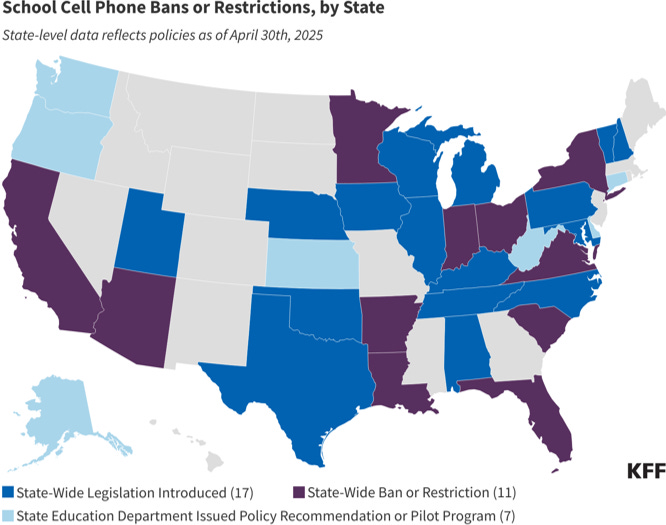|
Ban social media for teens under 16
In-school smartphone bans are great. But the policies don't go far enough.
I very consistently rail against the Missouri Legislature. And to be clear, they deserve it.¹
But I will give credit where it’s due: the Legislature sent a bill to the governor that would ban students from using cell phones during the school day.
This is great policy, and the data is overwhelmingly clear that this is good for kids. But it doesn’t go far enough: absent federal action, states should ban social media use for minors under 16.
Article summary:
States are right to ban students from using their phones during the school day (even outside of class).
Social media use is clearly bad for children, impacting everything from sleep to the incidence of depression to their literal brain chemistry.
Since the federal government isn’t taking action, states should be more aggressive in banning children under 16 from using social media.
The data confirms that phones in schools are very bad
This seems obvious: I don’t need data to tell you that cell phones are distracting. I work very hard to not be addicted to my phone and I’m fully addicted to my phone.
In social situations, when we have a split-second of downtime, we pull out our phone. When the phones are out, we’re less engaged in conversation, with our peers, and with the world.
But does the data back this up? Yes, emphatically—especially for students.
An analysis of nearly 150,000 students across 16 countries finds: “Smartphone addiction negatively impacts students’ learning and overall academic performance…. The greater the use of a phone while studying, the greater the negative impact on learning and academic achievement.”
According to a study, “smartphone bans reduced bullying rates in boys and girls, boosted female students’ GPAs and resulted in fewer consultations for ‘psychological symptoms and diseases among girls.’”
72% of high school teachers in America say that distraction from cell phones is “a major problem,” and the vast majority of teachers want to ban in-school phone use.
“Results indicated that students whose smartphones were physically removed during class had higher levels of course comprehension, lower levels of anxiety, and higher levels of mindfulness than the control group,” according to a 2022 study.²
Students themselves are self-reporting improvements in “grades, focus, and social interaction” when cell phone bans are implemented.³
Will students find ways around the rules? Unquestionably. But it’s clear that across the board, smartphone bans work.⁴
Post-COVID, the situation at schools is more dire
Boosting academic performance and student engagement are always worthy goals, but it’s especially important post-pandemic.
Teachers and educators are reporting shocking increases in threats and violence since 2020.
Students are nowhere close to recovering learning losses from the pandemic, and that’s especially true for some of the most at-risk students: homeless students, disabled students, English-language learners, and others.
These problems go far beyond smartphones, but they’re clearly exacerbating the issue. It’s no wonder that in-class cell phone bans are so popular across the U.S., and why so many states are moving in this direction.⁵
Smartphone bans don’t go far enough. Social media restrictions are essential
Ron DeSantis is right. (You won’t hear me say that too often.) Last year, he signed a bill that banned children under the age of 14 from having social media accounts.
The ACLU announced a lawsuit the same day, on First Amendment grounds. And there may well be some partisan motivations for DeSantis here, as the ACLU claims, but this is the wrong battle to pick: the data that social media is bad, especially for younger children, is unambiguous.
The baseline alone is jarring: teens spend, on average, almost five hours per day on social media—nearly one-third of their waking hours.⁶ The impact of that, unsurprisingly, is profound:
“Adolescent social media use is associated with higher rates of anxiety and depression,” as well as higher rates of eating disorders and sleep issues. (Source)
The heaviest social media users have twice the risk of negative mental health outcomes.
48% of children ages 13-17 say that the impact of social media is “mostly negative.” Only 11% say that it’s “mostly positive.” They’re on the front lines of this issue, and we should listen to them.
Chasing “likes” on social media has negative impacts on developing teens and literally changes their brain chemistry, making children more sensitive and, paradoxically, more compulsive social media users. This is especially important, because it points to the fact that the impact of social media is causally negative—we aren’t just looking at correlations.⁷
The solution here is to ban children under 16 from using social media. Why 16? Because the developmental impact is most profound before then, and giving students a few years to use social media with some parental supervision before they turn 18 is a logical, if imperfect, compromise.
Is this paternalistic? Sure, but the government is paternalistic all the time when it comes to children.
We don’t let people under 21 smoke cigarettes.⁸ Most states don’t let people under 16 drive cars. We don’t let minors sign contracts or purchase guns or see R-rated movies alone.
We do this because the government has an obligation to protect children, and this is an instance where the data is overwhelming that the status quo isn’t working.⁹
I’m not a Luddite, but the data here is clear
I’m not anti-technology.¹⁰ Innovation in science has led to remarkable gains in life expectancy and public health. I’m a serial ChatGPT user—it’s rare that I don’t use ChatGPT when I write, either to help with research or to help me proofread.¹¹
But: that doesn’t mean we should allow advances in technology to go unchecked.
Take car safety as an example. The death rate from car crashes has been in decline for decades, especially among children. Why? Because of changes in policy: since they were implemented, seat belt laws have saved hundreds of thousands of lives. So have airbags and backup cameras and other technologies.¹²
In an era where too many children are struggling with loneliness, lagging academic performance (since COVID-19 school shutdowns), and unhappiness, the solutions here are clear: policymakers should be aggressive in banning phones from schools and banning social media use for minors under 16.
Feel free to share this post with someone who might find it interesting. (If you’re reading this email because someone sent it to you, I hope you consider subscribing!)
Just last week:
They sent a ballot measure to ban abortion back to the voters, even though voters just legalized it via constitutional amendment in the election last November.
They repealed worker protection laws, even though voters overwhelmingly passed those protections at the ballot in that same election.
The evidence may be less robust, but in-school phone bans lead to better behavior. At one school in Connecticut, a robust smartphone ban led to a “30% to 40% decline in suspensions at the school.”
In general, the presence of a smartphone increases anxiety, and the median student spends more than 10% of their school day on their phone. (The math here: 43 minutes per student per day, and the average school day is 6.64 hours in the U.S.)
Of course, this means that some students are spending considerably more time on their phones—and I’m guessing, based on all of the other research, that students struggling socially and/or academically are spending even more time than that on their phones.
One of the very few arguments I’ve seen against cell phone bans from students is exceedingly weak: “Older students were more likely to acknowledge the benefits [of cell phone bans] but emphasized the importance of capturing memories like homecoming events with their phone cameras.”
A few thoughts here:
We were able to take pictures just fine in a pre-smartphone era.
Fewer pictures is probably just fine.
So, this argument holds exactly zero merit in my mind.
Oddly enough, one of the few groups that’s less in favor of these sorts of bans? Parents, who’ve grown accustomed to knowing where their children are all the time, and being able to reach them anytime and anywhere. (Of course, parenthood worked just fine in an era before you were able to reach your kid immediately at school.)
This map is already slightly out of date—namely, Missouri is missing—but it paints a good picture of what’s happening nationally. Bans are adopted in blue states, in purple states, and in red states. This isn’t a partisan issue.
Teens need about nine hours of sleep per night, according to this Johns Hopkins data, though that obviously varies a ton from child to child.
Said differently: we can’t just make the argument that lonelier people are more likely to be using social media in the first place. It’s an extremely compelling argument that social media is actually making people lonelier.
Social media companies have been compared to the tobacco industry. But it goes further than that: just for good measure, frequent social media use leads to increases in tobacco and e-cigarette use.
On top of everything else: despite its name (“social” media), people who spend more time on social media are significantly lonelier. As I’ve written about before, loneliness is one of the pressing issues of our time.
I love that the term “Luddite” comes from a 19th-century English political movement that mobilized against advances in technology. (And with the acceleration of AI, I wouldn’t at all be surprised to see neo-Luddism emerge as a movement.)
What this points to: this isn’t solely the responsibility of government. Advances in technology led by car companies have unquestionably saved lives too. There’s a lesson in here for social media companies.

